2019 South Florida International Water Polo Tournament: Notes & Quotes
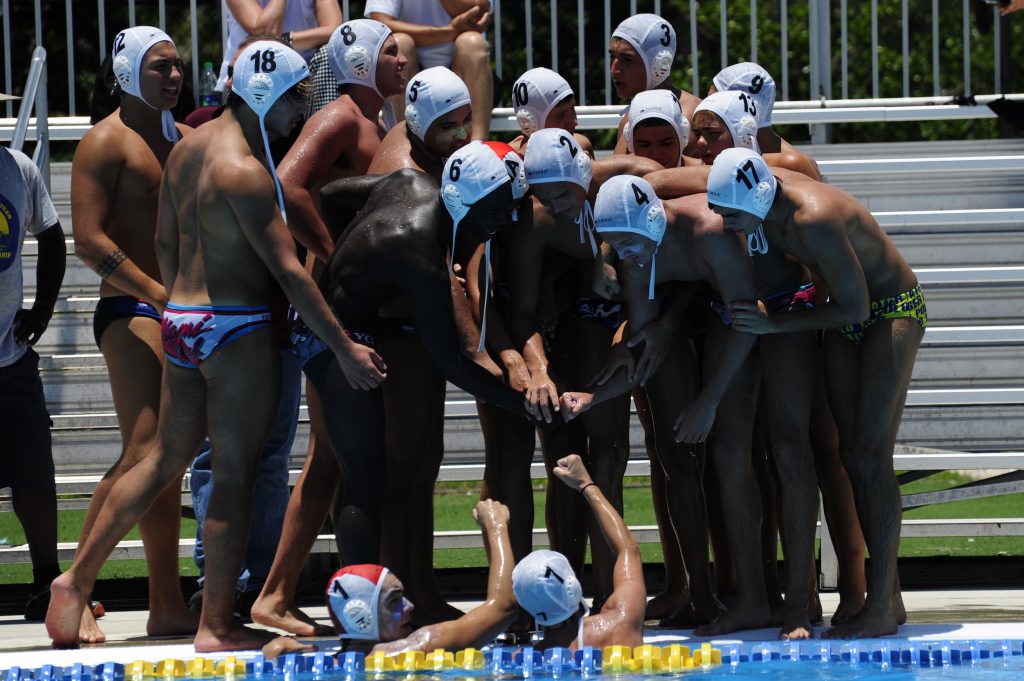
Editor’s Note: Swimming World was down in Coral Springs, Florida for the annual South Florida International Tournament. Offered by Michael Goldenberg, his daughter Elina and extensive coaching staff from the South Florida Water Polo Club, this annual age group tournament—started in 2003 by Istvan Csendes, Jim Shoemaker and Bruce Wigo—draws teams from all over the East Coast as well as from the Bahamas, Calgary, Chicago, Peru, Puerto Rico, Rome and other locations.
CORAL SPRINGS, FL. Taking a “man on the street” approach at the recent South Florida International Water Polo Tournament, Swimming World spoke with players, coaches, organizers and referees over the course of the final day of competition.
Following are transcripts of the various conversations; what perhaps makes this collection of snippets noteworthy is the eclectic nature of the responses as well as the consistent praise for a tournament that draws from a world-wide roster of polo clubs.
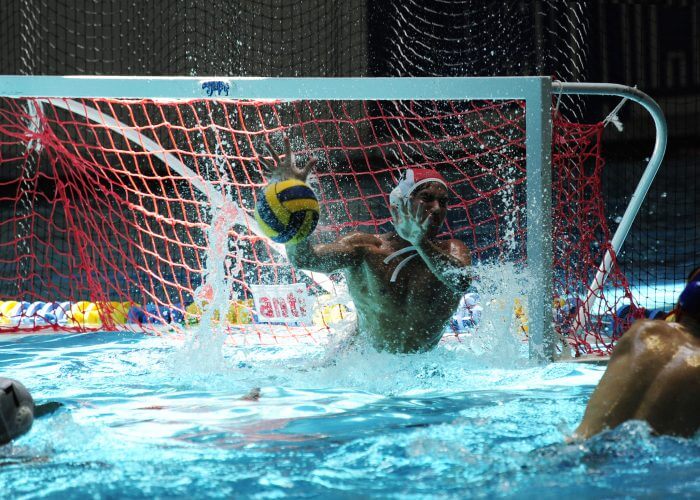
Photo Courtesy: Annie Tworoger, 3rd & Ocean
Davo Gharagezyan of Olympic Reserve Water Polo (ORWP) in Glendale, CA; his club finished 2nd in the 19U Boys category.
– How did you end up coming to this tournament?
We first started coming here when I was in 16U—that was ten years ago. We’ve been on and off throughout the years. It’s a great tournament, well-hosted, the weather’s really beautiful.
– You finished second in 19U; that’s a good result!
Our boys are all in the 16U. They’re playing up, so I feel great [about the result]—even though I would have loved to win this game just as a coach, but I’m very proud of what they did. Just to be in second place is a huge deal.
– What’s next for your club?
There’s a bunch of leagues that we’re participating in, the Cal Cup League, the Premier Cup League. We also do tournaments down in San Diego and Santa Barbara. But our main focus is preparation for the Junior Olympics and club championships.
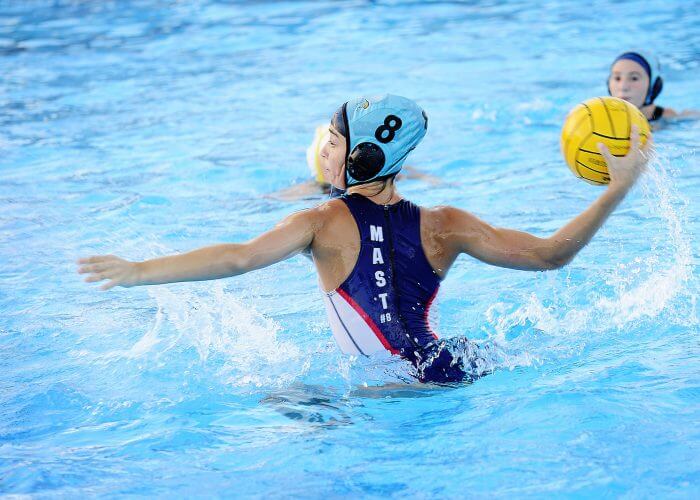
Photo Courtesy: Annie Tworoger, 3rd & Ocean
Brooke Coburn, Head Coach, Calgary Renegades of Calgary, CA. Her club finished 1st in the 19U Girls category and 4th in the 14U Coed category.
– How did you end up at this tournament?
Sunny weather is always a higher preference for us. We left -30º weather [in Calgary].
I’ve been coming on and off since 2009. For a while they were coming every year. In the past we’ve had some very good competition and we enjoy the sun. We came out four days earlier to get some good training in and development. That really what this is for—getting some unity as a team and individual drills and tactics.
– What other possibilities does a trip like this offer to your club members?
Again, our priority is to come and develop our club. At a young age for our 14U girls to come and play against some boys is always a positive for us. The bonus is we get to talk to some coaches and get exposure for the girls and they get to explore the different options out there that they may have.
Overall, it’s a positive experience for us.
– You played polo in Indiana so you’re quite familiar with the way the sport works in America.
This is my 26th year involved in the sport overall; I graduated from Indiana in 2008, which gave me a bit of a network which is nice because I got to go back and coach these girls and make sure they can explore [options in America] as fully as possible.
– What women from your club have recently made the jump into NCAA women’s varsity polo?
Kyra Christmas [2018 Golden Coast Conference Player of the Year] down in Pacific; she played in this tournament quite a few years. Zoe Osborne was our first Canadian ever to go to Harvard; she’s recently graduated.
There’s Kennedy Watson over in Pacific as well.
At one point we had over 20 girls in the NCAA [varsity] at once. There’s been quite a few who have recently graduated and moved on.
– This is a qualification year for the Olympics—so it’s a big year for the Canadian women.
The past couple of years we’ve been doing really well; we’ve got a new coach and a new system—Haris [Pavlidis] from Greece has been fantastic for us. We’re very optimistic about qualifying this summer.
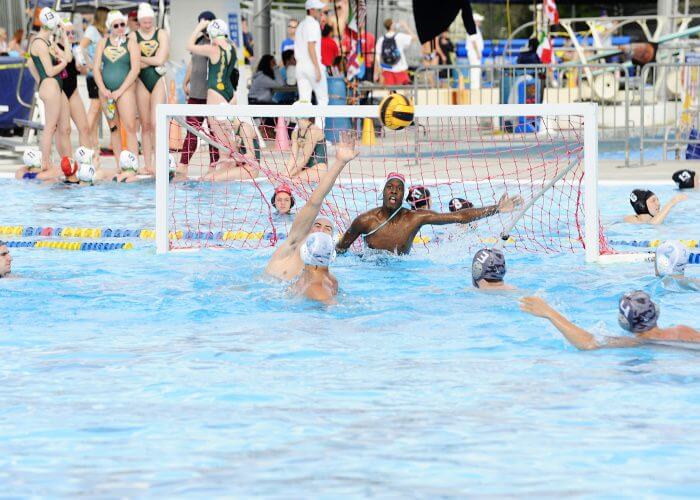
Photo Courtesy: Annie Tworoger, 3rd & Ocean
Alain Gullien, Coach for Campus Roma teams from Italy; he’s a former Cuban National Team player who lives in Miami. His team finished 10th in 19U Boys and 4th in the 16U Boys categories.
– Why bring an Italian team here to Miami?
Florida and Miami are diverse with a lot of international people. [The players] wanted to come here.
– How is the quality of player here?
It’s different here. Our club plays all over Italy and in different place in Europe. This was a totally different experience. Connecting with the American water polo players, with the culture and the city.
Tonight, we’re going to Miami Beach, so they get to different places. It’s a fantastic experience.
– How old are the teams?
It’s two teams; a 16U and 19U.
– Italy has a great tradition of water polo, including silver in the 2012 London Olympics and bronze in the Rio games. How does your team’s willingness to travel reinforce the idea of Italian excellence in the sport?
What’s interesting is that the most important thing that they’re going to bring back to Italy from the water polo down here is that the style of play is so different. In Europe and in Italy it’s so physical. So they can get away with a lot—grabbing and pushing—and the referees don’t call much.
Here they don’t allow a lot. I guess it has to do with safety and the philosophy in America. This has been and extreme contrast for them and they feel frustrated because of that.
It’s something that next time they need to adjust to.
– Is there a next time?!
They plan to come back.
Riccardo DiGiusepe (15 years old); has been playing water polo since seventh grade.
– What is your connection to the sport?
I love this sport. I’ve been with Coach Alain for a pretty long time. He has given me all this passion about polo and about dedicating myself [to the sport]. It’s been great.
My teammates and I learned a lot at this tournament—we learned a different way of playing water polo. We were so used to the Italian way and now we know the American way.
– What are your thoughts about what Luca Cupido, an Italian who came to America to play at Cal Berkeley?
I am a sophomore so I still have two years to go, and hopefully I can play college water polo in California and be the best I can possibly be. I hope that influences other guys I might play with [in Italy]—to transmit the same passion I have.
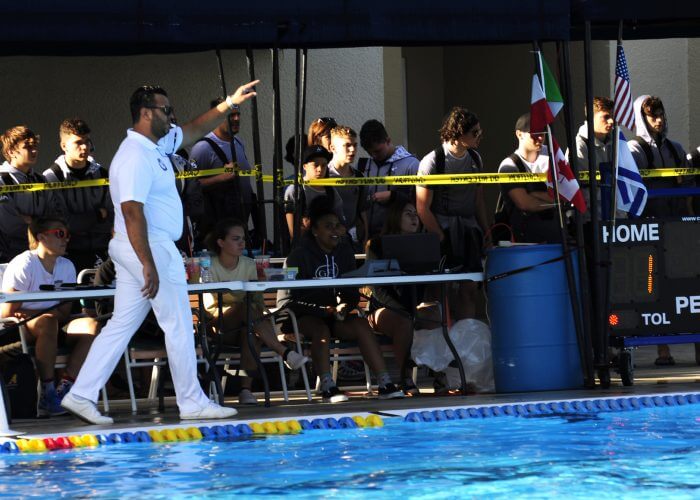
Photo Courtesy: Annie Tworoger, 3rd & Ocean
Referees Alex Stankevitch (from America) and Mike Dykman (from Canada)
Stankevitch:
– Your thoughts on this tournament’s impact on youth polo in America?
It’s a great opportunity for American teams to be involved in this tournament because there so many different ways of playing the game represented here. Teams from different countries and different continents do play in a different way. It is good for our kids to experience the game when it’s not played the way it’s often played in California.
[Our kids] should have more exposure to these kind of games—we should host more tournaments like this.
My hope is that this tournament will continue to improve and be played at a higher level.
Dykman:
– There’s not as much polo in Canada as there is in America.
In Canada, there’s not as many teams, so you play the same clubs over and over again. They need to get out, they need to see different styles from different teams. This is a great opportunity for them to be here and hopefully it will be an annual event for us.
– Given that you’re both FINA-trained referees, you have a sense of how the game is changing internationally. How will that affect age group polo in America?
Players have their own idea of how the game should be called, but just wait until next year. FINA changed the rules and next year it will be a different game.
What’s important is [that] many players and parents are feeding off coaches. If they stop listening to the coaches and play the game, everything would be fine.
Stankevitch:
– You said we need to raise the level of play in this country—but that’s not true in California, where the highest quality polo is played in America. We need to grow the sport here in South Florida and on the East Coast.
The biggest problem is we don’t have enough clubs on the East Coast. For example, a state like Florida has a climate similar to California; you can play here year ‘round. But there’s not enough growth here. There should be a couple of teams in the universities, because most of the Florida kids are forced to go somewhere else [to keep playing].
In California, you can play every day of the week. We have an annual event here, they play high school a little bit, and after that we’re forced to travel—either up north where there’s a little bit more polo in the Northeast, or if you want the best polo in the country you must go to California.
It is a tradition, a very popular tournament which everybody talks about. We do see some new clubs here, which is great to see. Capitals [from the Washington DC area] have been coming for a couple of years. I know Navy’s rebuilding and brought a lot more teams this year.
Italy’s the first time there here. The international field has always been well-represented, but we need more growth in the rest of the United States—North to South.
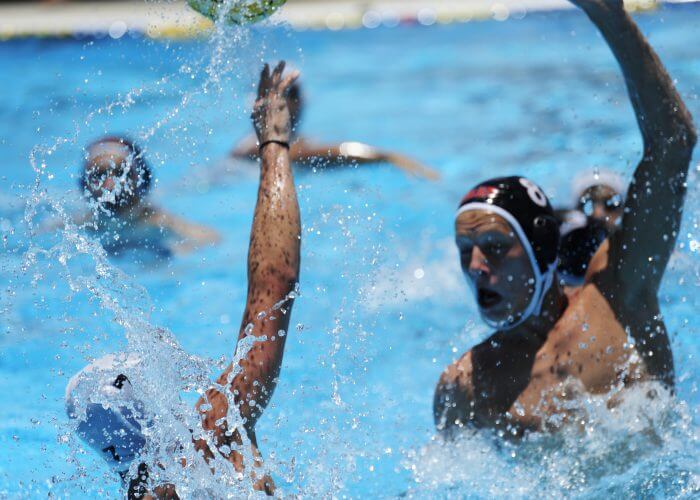
Photo Courtesy: Annie Tworoger, 3rd & Ocean
Augusto Otero, head coach of Regatas de Lima from Lima, Peru. His club finished 3rd in the 19U Boys category.
– How long have you been coming to this tournament?
It’s my first time as a coach. I’m a 21U player on the national Peruvian team and I’ve always played for Regatas, and they asked if I could come coach for this tournament. Obviously I said I would love to. This is the third year that we come to this tournament. The first time we finished last, second year we ended fifth and this year we have third place. We are really happy that we’re improving a lot.
– It’s a long way from Lima to Miami. What makes the trip worthwhile?
Peru has always played against the U.S. in the Pan American Games, especially in younger categories. We know that the water polo levels high; in this tournament there were 16 teams participating; in Lima there are only three teams.
Coming to a tournament of this level is really important to us. We get to learn a lot and it’s a preparatory tournament as well for our national tournament.
– You mention the Pan American Games which Peru will host this year. How important is that tournament to water polo in your country?
It’s the first time Peru qualifies for the Pan American Games in water polo—basically because we are the hosts. We have to work a lot but it means a lot to us to host this amazing event. We’ll give our best and hopefully everybody will have fun and play responsibly. Everyone will see the amazing things that Peru has to offer.
We hope that after the games people will increase interest in water polo; they’ll come and watch the sport. A lot of new pools are being built for the games.
Hopefully we can create more clubs and make the water polo level in Peru grow.
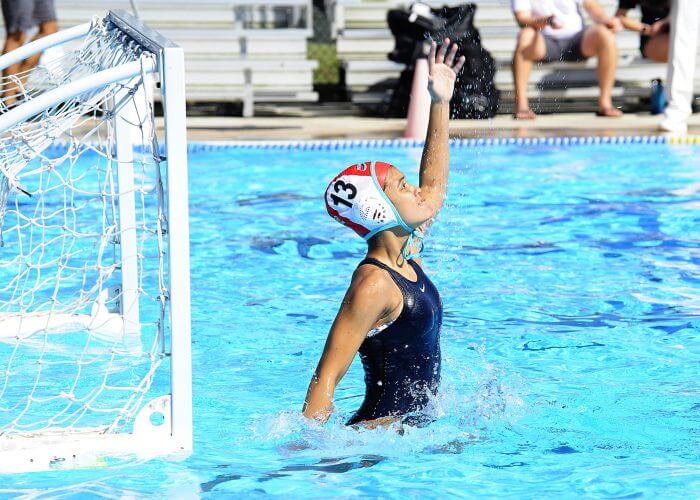
Photo Courtesy: Annie Tworoger, 3rd & Ocean
Miles Rief, Northern Illinois Polo Club (NIPC). His club finished 2nd in the 14U Coed category.
Our club has sent high school girls in the past but this is the first time we’ve brought our age group kids. Most of the team is from our club and we pulled in some people from St. Louis to make a team of it. We came down here and did very well—we at least beat our expectations and captured second place, so we’re real happy.
To come out and play teams you don’t play very often is a great experience.
– What’s the temperature back in Chicago?
It’s 13º and expecting snow! You can’t come down here and lose, whatever you do.
– How does this competition prepare you for upcoming competitions?
it will be great if we get a good JO run. A lot of these kids are gonna represent the Midwest Zone in the upcoming ODP Tournament in Southern California. My son’s on that team—so I’ll be there for sure.
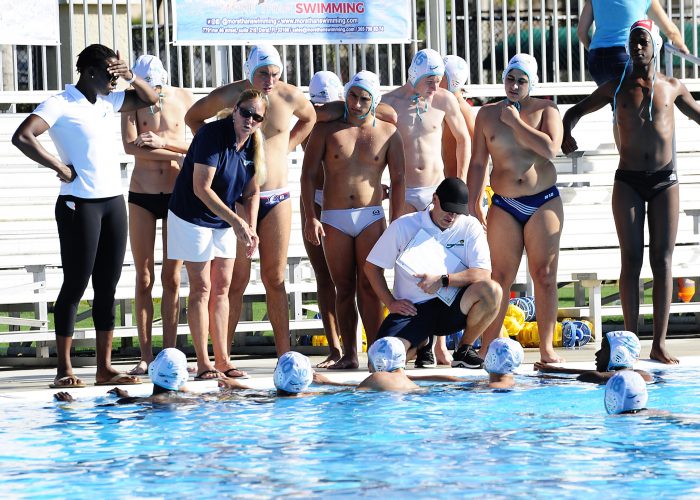
Photo Courtesy: Annie Tworoger, 3rd & Ocean
Donna Johnson and her daughter Chelsea, who is a coach for the Miami Riptides. Chelsea just graduated from Princeton, where she played polo for four years with the Tigers.
Donna:
– With five kids playing polo, you’re as invested in this sport as any parent could be!
I think I’ve been involved as long as the club exists—the Riptides, where the kids started and where they continue. Chelsea is coaching with them. I think she’ll always be affiliated with the Riptides.
[My children] are my only connection to the sport. I never heard about water polo before. I just wanted somewhere for my kids to swim because I had a pool at home. We found a park right next door to the school, and Coach Carroll became a second mother to the kids. We became a part of her family and she became a part of my family. Socially, that’s the only place I go—where coach Carroll invites me.
Chelsea:
– You’ve been playing water polo for more than half your life. What is it about your connection to a sport and a community?
It’s the people that you meet that has been a home for me. I just love playing this sport with people that I’ve known for my whole life. So, my connection is both to the sport and my club. It’s really my life. I’ve been playing water polo for a really long time. I can’t see myself without it.
– As time has gone by, have you noticed a change in attitudes towards the sport in Miami?
There are more teams; even right now there’s teams at this tournament that I’ve never heard of. So, I believe that water polo is expanding; it’s getting bigger and better and there are more teams that we can compete against.
It’s growing in South Florida which is really cool to see, and there are kids who are joining water polo—even kids at Ransom—who know water polo just because of my sister. They join the team because they want to see what it is and they stick with it. The club teams are growing, the school teams are growing and the sport itself is expanding.
– There’s a tipping point for the sport, when the best athletes choose polo as their first sport. What will it take for that to happen here in South Florida?
We never really played any other sports. We did gymnastics, but we went with water polo because we started at Cutler Ridge Pool with Coach Carroll and the swim team, and on Fridays we could play water polo if we swam four days of the week. That’s where we started when we were eight years old.
We never really ventured out into other sports—but we played them for fun.
Donna:
– Through your children you’ve become a water polo lifer. As you see your children aging out, how do you maintain a connection? Are you an evangelist for the sport?
I’m not really evangelical about it; I don’t go out looking for people to play water polo at all. But people have asked me because of Ashleigh, how they can get [their children] into water polo. I of course refer them to the Riptides.
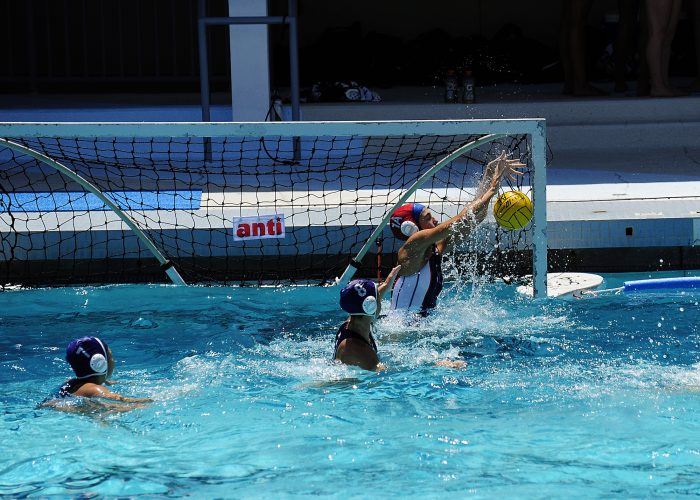
Photo Courtesy: Annie Tworoger, 3rd & Ocean
Elrick De La Cruz, Loyola Water Polo of Puerto Rico; he played for Brian Kelly at Iona. His club finished 7th in the 14U Coed, 3rd in the 16U Boys and 4th in the 19U categories.
– Why this tournament?
I came here as a player (three years ago). I know Loyola has been coming here for the last five to eight years. it’s close to Puerto Rico, so that’s pretty good for our kids to have exposure.
This year we bring three teams: 14U, 16U and 19U. We’re very happy with the tournament because it’s a great opportunity for all the kids of different ages to be part of the polo community.
– How possible is it for some of your players to come back and play college ball in the States?
They would love to play at another level of water polo. If they practice hard, get good grades and keep coming to the States to see if a college wants to recruit them—and to have a career as a player and a student.
This [tournament] is an opportunity for great exposure [to play] against better teams.
Puerto Rico does have some teams at the college level, but not nearly as many as here in the States. We definitely look for any opportunities for them to come here.
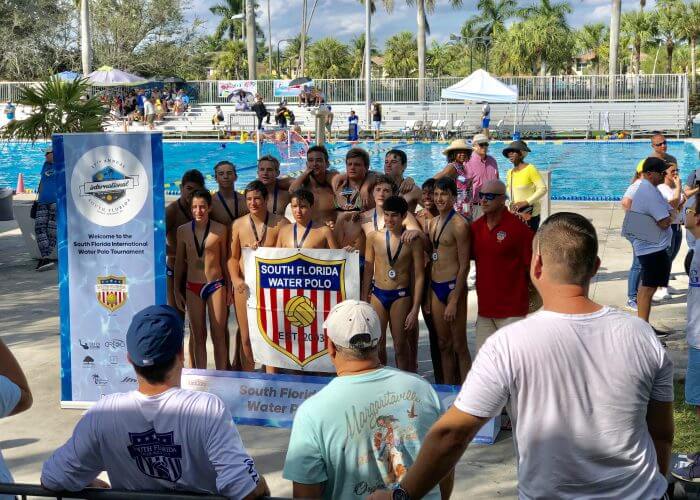
Photo Courtesy: Annie Tworoger, 3rd & Ocean
Michael Goldenberg, South Florida Water Polo Club. His club is the organizer for the tournament and won Gold in the 16U and 19U Boys categories while 9th in the 14U Coed and 4th in the 19U Girls categories.
– Your teams took home two golds—16U and 19U boys. You’ve got to feel good about that!
Sometimes it happens, sometimes it doesn’t.
The tournament started in 2003 by Bruce Wigo, Jim Shumaker and Istvan Csendes. I came on board into the club in 2005 and since 2011 I’m pretty much leading the club as head coach.
– This is obviously a labor of love.
You’re not going to make a living off of this.
This tournament is like a trademark already. People around the U.S. and people outside the country know about this tournament, they start preparing for it a long time in advance. It’s known for high quality games, high quality officiating—and we’d like to keep it that way.
That’s very important because us, because if we want to grow water polo as a sport we have to present a good product. Otherwise you’re not going to get anybody.
– This is a high-quality tournament in your part of the country; how important is that as an alternative to California polo?
People in Southern California and even Northern California—those areas are over-saturated with competition. To them it’s not much fun because they have it almost every weekend.
To these kids that live on the East Coast, South Florida, other countries—when they come here they enjoy every single game because games [for them] don’t happen as often. And games of a high-level happens even less often.
It’s like a holiday for everyone—especially when the weather cooperates. It makes it just great!



